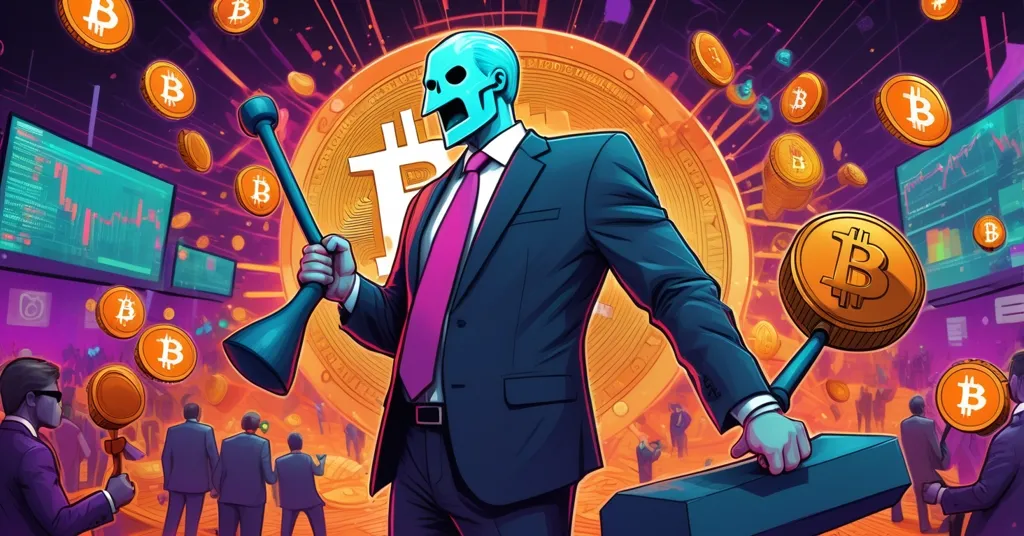Philippine SEC Targets Unregistered Crypto Exchanges in Bold Crackdown

Philippine SEC Slams Unregistered Crypto Platforms in Sweeping Crackdown
The Philippine Securities and Exchange Commission (SEC) has unleashed a fierce offensive against unregistered cryptocurrency platforms, sending a loud and clear message to Filipino investors: deal with unauthorized exchanges at your own peril. With new regulations now in effect, the agency is targeting a slew of global players for operating without licenses, aiming to shield users from devastating losses, rampant fraud, and even darker threats like money laundering.
- Hardline Regulation: SEC rolls out Crypto Asset Service Provider (CASP) Rules, mandating registration for digital asset services since July 5, 2024.
- Targeted Platforms: Ten unlicensed exchanges, including OKX, Bybit, and Kraken, called out for violating local laws.
- Investor and Systemic Risks: Warnings of fund loss, fraud, and money laundering risks, paired with aggressive enforcement plans.
- Innovation at Stake: High compliance barriers could stifle smaller blockchain players and challenge crypto’s core ethos.
CASP Rules Explained: A High Bar for Crypto Compliance
Since July 5, 2024, the Philippine SEC has enforced a stringent regulatory framework through SEC Memorandum Circular Nos. 4 and 5, better known as the Crypto Asset Service Provider (CASP) Rules. These guidelines target any entity facilitating digital asset trading or intermediation services, requiring them to register as stock corporations in the Philippines with a minimum paid-up capital of PHP100 million—roughly $1.8 million. That’s a hefty price tag, especially when compared to startup costs in other tech sectors or more lenient crypto hubs like Singapore, where capital requirements can be significantly lower for smaller players. For context, launching a basic fintech app might cost under $100,000, making this barrier a potential death knell for local blockchain startups dreaming of competing with global giants.
Beyond the financial hurdle, registered CASPs must segregate customer funds from their own operational reserves—a critical safeguard inspired by disasters like the FTX collapse in 2022, where commingled funds led to billions in losses. They’re also obligated to educate users on the inherent risks of digital assets, ensuring investors understand the volatility and potential pitfalls before diving in. These measures scream investor protection, but they also paint a target on the back of any platform that can’t—or won’t—meet these demands. For Filipino investors, many of whom turn to crypto for remittances or speculative gains, this is a double-edged sword: safer waters, but fewer ships to sail on.
Named and Shamed: Unregistered Crypto Exchanges Under Fire
On August 4, 2024, the SEC dropped a bombshell advisory, publicly naming ten cryptocurrency platforms operating without authorization in the Philippines: OKX, Bybit, MEXC, Kucoin, Bitget, Phemex, Coinex, Bitmart, Poloniex, and Kraken. These aren’t small-time scammers; many are heavyweight global exchanges with massive user bases. Yet, despite their accessibility to Filipino users via apps and websites, they lack the SEC’s stamp of approval to legally offer services or solicit investments. The agency didn’t hold back, listing a laundry list of risks tied to unregistered exchanges, from total loss of funds to exposure to fraud, market manipulation, and identity theft. Worst of all, if things go sideways, users have no legal recourse—essentially playing a high-stakes game of roulette with their hard-earned pesos.
“These platforms have no license, registration, or authorization from the SEC to operate in the Philippines or to solicit investments from the public. Their actions are unauthorized and expose Filipino investors to significant risk, including: a) Total loss of funds b) No legal recourse c) Exposure to fraud, market manipulation, and identity theft.” – Philippine SEC Warning
Bitget, one of the named platforms, was quick to respond, distancing itself from the broader implications of the advisory. Hon Ng, their Chief Legal Officer, argued that the issue is purely about local registration formalities and doesn’t reflect on Bitget’s global operational integrity. They pointed to transparency measures like Proof of Reserves—publicly verifiable records showing they hold user funds 1:1—and highlighted recent licensing wins in markets like Argentina, Georgia, Dubai, and El Salvador. Meanwhile, other big names like OKX, Bybit, and Kraken have either declined to comment or stayed eerily silent. Are they ghosting the Philippine market, betting on flying under the radar, or just not taking the SEC seriously? That’s anyone’s guess, but it’s a risky gamble in the face of a regulator ready to swing hard, as detailed in the Bitget response to the advisory.
“Bitget acknowledges the Philippine SEC’s advisory and is actively assessing the details. Importantly, this advisory relates solely to registration formalities in the Philippines and does not reflect the safety or stability of Bitget’s global operations.” – Hon Ng, Chief Legal Officer at Bitget
“We remain committed to securing licenses in markets we operate in. We have obtained VASP and other licenses in Argentina, Georgia, Dubai, and El Salvador this year alone.” – Hon Ng on Bitget’s Commitment to Compliance
Systemic Threats: Money Laundering and Beyond
The SEC isn’t just worried about individual investors getting burned; they’re raising hell over broader threats to the Philippine economy. Unregistered platforms often lack robust Anti-Money Laundering (AML) systems—policies designed to prevent illicit financial flows—which the CASP rules mandate for compliant entities. Without these controls, crypto exchanges can become pipelines for money laundering and terrorist financing (ML/TF), exploiting anonymous transactions and cross-border transfers to move dirty money undetected. It’s a nightmare scenario for any government, especially one like the Philippines that clawed its way off the FATF gray list in October 2023 after years of scrutiny for weak financial crime controls. The FATF, an international watchdog, flags countries with inadequate safeguards, and a return to that list could tank foreign investment and restrict banking access for everyday Filipinos.
“Unregistered crypto-asset platforms may be exploited for money laundering and terrorist financing (ML/TF).” – SEC on AML Risks
This isn’t hypothetical paranoia. The borderless nature of crypto makes it a magnet for bad actors, and past Philippine vulnerabilities—combined with high remittance volumes often funneled through digital assets—heighten the stakes. While the country has made strides in AML compliance, the SEC knows that even a few rogue platforms could undo years of progress. It’s a stark reminder that crypto’s freedom comes with strings attached, especially when national reputation hangs in the balance.
Enforcement or Overreach? SEC’s Battle Plan
The SEC isn’t messing around when it comes to enforcement. Their strategy is a full-on blitz: issuing cease and desist orders, blocking websites and apps of non-compliant platforms, and filing criminal complaints under securities laws. They’re also partnering with tech giants like Google, Apple, Meta, and TikTok to wipe out unauthorized marketing content—a move targeting the shady promotions that flood social media. At Philippine Blockchain Week 2024, Assistant Director Atty. Paolo Ong underscored the agency’s resolve, framing the CASP rules as a way to bolster local players while arming enforcement teams with sharper tools to tackle rogue operators, as noted in reports on the SEC’s crackdown efforts.
“The rules were issued to support local players and go after those unregistered ones. We believe that the rules will give more teeth to our enforcement team.” – Atty. Paolo Ong, Assistant Director at the SEC
“The CASP guidelines emphasize segregation of customer funds from exchange funds. It’s because we see that learning from [the] collapse of other exchanges is really a key measure to protect investors [and] funds.” – Atty. Paolo Ong on Investor Protection
But let’s peel back the curtain—enforcing rules in a decentralized digital realm is like trying to pin down a ghost. Blocking apps sounds tough, but VPNs and peer-to-peer trading can easily skirt these barriers. And while teaming up with tech giants might curb the noise of fake crypto gurus on TikTok, it risks overreach. Could we see legitimate blockchain discussions caught in the crossfire? The influencer crackdown—requiring SEC registration for marketing digital assets—aims to stop hype-driven scams, but policing a borderless internet is a Herculean task. Crypto Twitter’s self-proclaimed prophets might finally need real jobs, though I wouldn’t bet on it just yet.
The Decentralization Dilemma: Freedom vs. Control
Let’s not sugarcoat it—regulation in crypto is a brutal tug-of-war. On one side, the SEC’s crackdown feels like a necessary reality check for an industry plagued by scams, rug pulls, and overnight vanishing acts. Filipino investors, riding a wave of adoption fueled by overseas remittances (a lifeline for many families), deserve safeguards from platforms that could disappear with their life savings. The urgency is real; industry reports peg the Philippines as a top crypto adopter in Southeast Asia, with millions dabbling in Bitcoin and altcoins for both practical and speculative reasons.
But flip the coin, and these rules—especially the PHP100 million capital requirement—could suffocate the very innovation that makes this space electric. Local startups with big ideas but small budgets might get priced out or driven underground, while global giants like OKX or Kraken can absorb the cost without breaking a sweat. Compare this to somewhere like Malta, often dubbed a “blockchain island,” where lighter capital demands have lured in droves of crypto firms. Are we building a safer market, or just handing the keys to the old financial elite under a new guise? The impact on blockchain startups in the Philippines could be profound.
For Bitcoin maximalists like myself, this stings even harder. Bitcoin was born from a cypherpunk vision of permissionless, borderless finance—a middle finger to centralized control. Yet here we are, watching regulators slap on the same shackles we sought to escape. Sure, fraud doesn’t help mass adoption, and even the staunchest HODLers can’t ignore that. But overregulation risks killing the rebellious spirit that makes crypto a potential future of money. Altcoin ecosystems and protocols like Ethereum, powering DeFi experiments, or remittance-focused tokens, fill niches Bitcoin doesn’t—and shouldn’t—tackle. They deserve a fair shot, provided they don’t fleece users along the way.
Global Context: Part of a Bigger Regulatory Storm
The Philippines isn’t dancing this regulatory tango alone. Across the globe, governments are wrestling with how to tame crypto without killing it. The EU’s Markets in Crypto-Assets (MiCA) framework sets a comprehensive standard, while the US SEC has been hammering platforms like Binance with lawsuits. India recently took a sledgehammer to offshore exchanges, blocking access for non-compliant players. The Philippine approach walks a tightrope—protective, yet potentially punitive. It’s a microcosm of the larger battle for crypto’s soul: can we accelerate this financial revolution (shoutout to effective accelerationism, or e/acc) while dodging the scams, or will control crush the dream of decentralization? For broader context, exploring the global legality of cryptocurrency regulations provides valuable insight.
Back home, the SEC’s actions might resonate with users burned by past scams, though concrete data on local crypto fraud is sparse. Social media sentiment, often a pulse for Filipino investors, swings between frustration at limited options and relief at curbing shady operators. If the SEC keeps swinging this hard, will we see Bitcoiners trading via VPNs or darknet markets? Don’t laugh—stranger things have happened in this wild frontier, as discussions on platforms like Reddit highlight community reactions to the crackdown.
Key Takeaways and Questions for Reflection
- What are the CASP Rules, and what do they demand from crypto platforms?
The Crypto Asset Service Provider (CASP) Rules, effective July 5, 2024, require platforms to register as Philippine stock corporations with PHP100 million ($1.8 million) in capital, segregate user funds, and educate investors on risks, aiming to ensure safety and accountability. - Why is the Philippine SEC cracking down on unregistered exchanges?
The SEC seeks to protect Filipino investors from devastating losses, fraud, and no legal recourse, while preventing systemic risks like money laundering that could tarnish the country’s global financial standing. - How do these regulations impact smaller blockchain players?
High capital requirements could price out local startups, stifling innovation and potentially driving them underground, while larger global exchanges might comply more easily, skewing the playing field. - Can the SEC effectively enforce rules in a decentralized space?
While partnerships with tech giants like Google and Apple aim to curb unauthorized marketing, blocking decentralized apps and peer-to-peer trading is a steep challenge, risking overreach or ineffective measures. - Does regulation help or hurt crypto’s disruptive potential?
It’s a tightrope—rules can build trust and prevent chaos, vital for mainstream adoption of Bitcoin and beyond, but heavy-handed control clashes with the freedom and borderless ethos that define this financial revolution.
As the Philippine SEC tightens the screws on unregistered crypto platforms, the message to investors is stark: play by the rules or risk it all. For the industry, it’s a wake-up call to align with local laws or face the boot. And for champions of decentralization, it’s a bitter clash between necessary safeguards and the soul of permissionless finance. Whether the Philippines emerges as a crypto safe haven or a cautionary tale of control gone too far, one truth remains—this fight over freedom versus oversight is just getting started.



